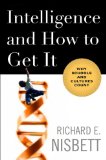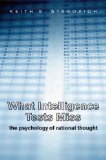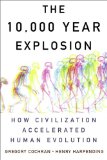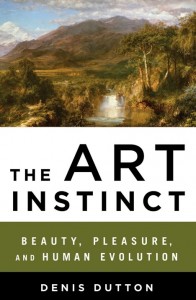January 22, 2009

Intelligence and How to Get It: Why Schools and Cultures Count by Richard E. Nisbett (Norton, 2009).
Product Description
A bold refutation of the belief that genes determine intelligence. Who are smarter, Asians or Westerners? Are there genetic explanations for racial differences in test scores? What makes some nationalities excel in engineering and others in music? Will math and science remain a largely male preserve. From the damning research of The Bell Curve to the more recent controversy surrounding geneticist James Watson’s statements, one factor has been consistently left out of the equation: culture. In the tradition of The Mismeasure of Man by Stephen Jay Gould, world-class social psychologist Richard E. Nisbett takes on the idea of intelligence as something that is biologically determined and impervious to culture–with vast implications for the role of education as it relates to social and economic development. Intelligence and How to Get It asserts that intellect is not primarily genetic but is principally determined by societal influences. Nisbett’s commanding argument, superb marshaling of evidence, and fearless discussions of the controversial carve out new and exciting terrain in this hotly debated field.

What Intelligence Tests Miss: The Psychology of Rational Thought by Keith Stanovich (Yale University Press, 2009).
Product Description
Critics of intelligence tests—writers such as Robert Sternberg, Howard Gardner, and Daniel Goleman—have argued in recent years that these tests neglect important qualities such as emotion, empathy, and interpersonal skills. However, such critiques imply that though intelligence tests may miss certain key noncognitive areas, they encompass most of what is important in the cognitive domain. In this book, Keith E. Stanovich challenges this widely held assumption.
Stanovich shows that IQ tests (or their proxies, such as the SAT) are radically incomplete as measures of cognitive functioning. They fail to assess traits that most people associate with “good thinking,” skills such as judgment and decision making. Such cognitive skills are crucial to real-world behavior, affecting the way we plan, evaluate critical evidence, judge risks and probabilities, and make effective decisions. IQ tests fail to assess these skills of rational thought, even though they are measurable cognitive processes. Rational thought is just as important as intelligence, Stanovich argues, and it should be valued as highly as the abilities currently measured on intelligence tests.
Coming later this year: Intelligence 101 by Jonathan Plucker (Springer, August 2009).
Comments (0)
- cognitive science,culture,new books
January 18, 2009

The 10,000 Year Explosion: How Civilization Accelerated Human Evolution by Gregory Cochran and Henry Harpending is new or coming soon from Basic Books, with a publication date listed as Jan. 26; as of today (Jan. 18) Amazon doesn’t have it as a pre-order or in stock, but “ships within 7 to 11 days.”
Product Description
Resistance to malaria. Blue eyes. Lactose tolerance. What do all of these traits have in common? Every one of them has emerged in the last 10,000 years.
Scientists have long believed that the “great leap forward” that occurred some 40,000 to 50,000 years ago in Europe marked end of significant biological evolution in humans. In this stunningly original account of our evolutionary history, top scholars Gregory Cochran and Henry Harpending reject this conventional wisdom and reveal that the human species has undergone a storm of genetic change much more recently. Human evolution in fact accelerated after civilization arose, they contend, and these ongoing changes have played a pivotal role in human history. They argue that biology explains the expansion of the Indo-Europeans, the European conquest of the Americas, and European Jews’ rise to intellectual prominence. In each of these cases, the key was recent genetic change: adult milk tolerance in the early Indo-Europeans that allowed for a new way of life, increased disease resistance among the Europeans settling America, and new versions of neurological genes among European Jews.
Ranging across subjects as diverse as human domestication, Neanderthal hybridization, and IQ tests, Cochran and Harpending’s analysis demonstrates convincingly that human genetics have changed and can continue to change much more rapidly than scientists have previously believed. A provocative and fascinating new look at human evolution that turns conventional wisdom on its head, The 10,000 Year Explosion reveals the ongoing interplay between culture and biology in the making of the human race.
The book has a website with chapter summaries and related information.
Comments (0)
- culture,human evolution,new books
December 21, 2008

The Art Instinct: Beauty, Pleasure, and Human Evolution by Denis Dutton (Bloomsbury, 2008) is due out on Dec. 23, maybe just in time for Christmas if your local bookstore has it, or perhaps something to keep in mind if you have gift certificates to use after the holidays.
Here is the product description:
In a groundbreaking new book that does for art what Stephen Pinker’s The Language Instinct did for linguistics, Denis Dutton overturns a century of art theory and criticism and revolutionizes our understanding of the arts.
The Art Instinct combines two fascinating and contentious disciplines—art and evolutionary science—in a provocative new work that will change forever the way we think about the arts, from painting to literature to movies to pottery. Human tastes in the arts, Dutton argues, are evolutionary traits, shaped by Darwinian selection. They are not, as the past century of art criticism and academic theory would have it, just “socially constructed.”
Our love of beauty is inborn, and many aesthetic tastes are shared across remote cultures—just one example is the widespread preference for landscapes with water and distant trees, like the savannas where we evolved. Using forceful logic and hard evidence, Dutton shows that we must premise art criticism on an understanding of evolution, not on abstract “theory.” He restores the place of beauty, pleasure, and skill as artistic values.
Sure to provoke discussion in scientific circles and uproar in the art world, The Art Instinct offers radical new insights into both the nature of art and the workings of the human mind.
The book has a website, though not a lot is there yet. See also: author’s website. According to Wikipedia, Dutton is a co-founder of the website Arts & Letters Daily Review, which I have often visited and enjoyed.
Comments (0)
- culture,new books
November 20, 2008

I mentioned Gladwell’s new book Outliers: The Story of Success awhile ago, but it seems worth mentioning again, now that the book has been released and there are lots of related links. The Amazon page has a short video from Gladwell introducing his book.
At Gladwell.com there is a Q&A about the book and some excerpts; also an announcement on Gladwell’s blog.
See also:
Comments (0)
- culture,new books,psychology
November 9, 2008

Beyond “information overload” … The Reality Overload: The Modern World’s Assault on the Imaginal Realm by French Surrealist Annie Le Brun (Inner Traditions, 2008)
Product Description
…
What underlies the many problems of the modern world–from accelerating rates of extinction and desertification to the increased alienation of the individual–is a reality overload, an increasingly invasive mechanization and homogenization of modern life that glorifies consumption and conformity. This overload has been created from the constant force-feeding of too much information, a phenomenon that dispossesses us of our deepest connections to time, our physical world, and each other.
Annie Le Brun explains that the degradation of the environment mirrors the devastation going on in our minds revealing a link between genetically modified foods and the transformation and decay of our language and communication. There is a direct relationship between the rupture of the great biological balances that govern the planet and the equally devastating rupture in our imaginal realm. The imaginal realm is the home of our dreams and the perceptions that feed our thoughts, individuality, and creativity. Without its influence we are forced to live a drab, alienated lifestyle based on consumption alone. If, as Shakespeare claims, “we are such stuff as dreams are made on,” this theft of our imagination by the reality overload threatens the very foundations of our existence.
More information, including table of contents and an excerpt, is available at the publisher’s website.
See also: review at Leonardo Reviews
Comments (0)
- culture,new books








